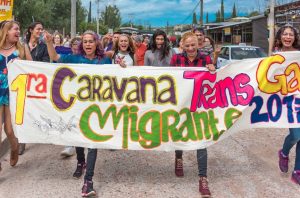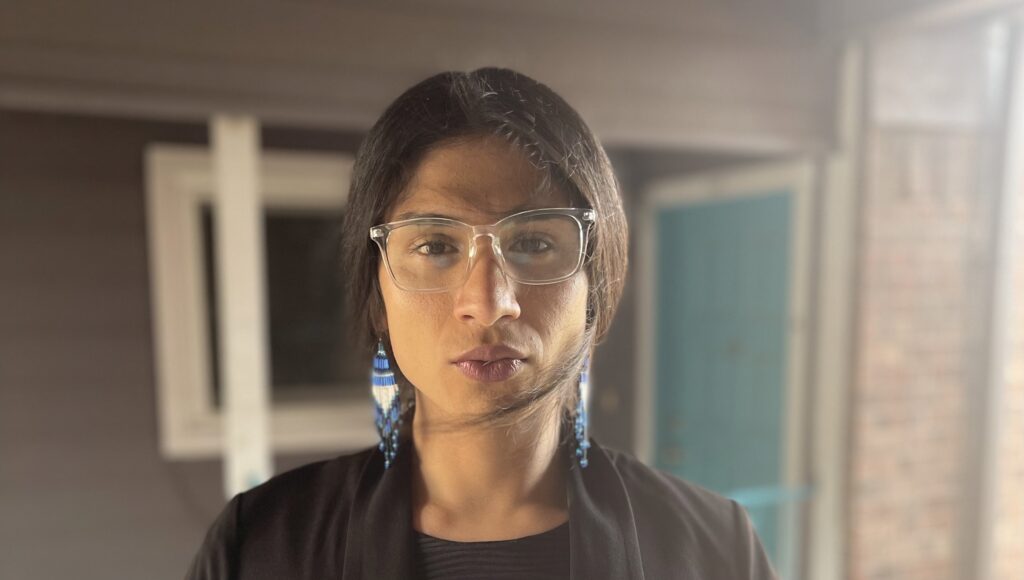by Nakay Flotte
“¡Esas, esas, esas que caminan, son las travestis, transexuales de América Latina!” (“Those, those, those that walk are the transsexuals of Latin America”). These were the words shouted by a group of 200+ LGBTQ Central American refugees from Honduras, El Salvador, Guatemala, and Nicaragua after a meeting in Mexico City, during what came to be known as the 2018 Central American Exodus. These refugee leaders, and the practices of state persecution that came before and after the Central American Exodus, are at the center of my research.
The Central American Exodus of late 2018 and early 2019, during Trump’s presidential apogee, became a climax in the “caravanization” of Central Americans and others illegally and otherwise traversing Mexico in order to reach the US-Mexico border and seek asylum to the United States. The offshoring of the United States’ border security to halt Central American mobility in Mexico set the stage for the further “caravanization” of refugee and migrant mobility through Mexico as well as the rise of lower-scale criminal groups interested in exhorting or kidnapping migrants, whether riding the train or stuck in a city awaiting to travel further north. These novel practices of increased, outsourced security from the United States to Mexico, what I call practices of “border-making,” led to the rise of the “caravans,” massive assemblages of displaced peoples from all ages and backgrounds, traveling together to evade immigration enforcement.
These forms of massive “transmigration” (or in-transit migration) must be understood not only as social movements but also as life-making projects. The Central American caravans must be first understood as the safest available mode of transportation for refugee people with no funds for a coyote. Much like a raft that helps people transport themselves from point A to B and is later abandoned, a caravan allows the traveler to receive aid from hundreds of volunteers and organizations to arrive at their destination. Collectivized transmigrations ensure safety and protection, especially for trans queer migrants, including minors, that have little or no access to remittance capital from family in the United States.

My research analyzes collectivized migrations or “caravans” since 2015, not only as immigrant or refugee social movements that challenge the United States’ expanding border regime, but also as a medium of collective transportation used by trans queer refugees to effectively escape their status as fugitives from the law. In mobilizing alongside transnational advocacy networks of lawyers, journalists, non-profits, religious leaders, and political figures from many parts of the world, many Central American refugees were able to successfully reach the US-Mexico border to seek asylum. The arrival of “caravans” came to an end after March 2019, followed by the longest government shutdown in US history, and the implementation of the Mexican National Guard as a response to the United States’ threats to increase tariffs for imported goods from Mexico. The deployment of the National Guard prevented most civil and religious organizations from having access to migrant people, thus disintegrating and dismantling collectives of thousands of people in Southern Mexico throughout early 2019.
In studying the migrant caravans, I rely on Indigenous community feminism, particularly that of Mayan activist and thinker Lorena Cabal, who proposes the concept of “acuerpamiento,” a form of embodied accompaniment and care for one another. I make use of a methodology called reciprocal ethnography, a power-conscious decision to support the people that provide “data,” thus transcending traditional research boundaries and challenging the extractive nature of field ethnographic research. By relying on the concept of reciprocity, I seek to challenge conventional methodologies of field-research that often rely on a dynamic I refer to as “absence after extraction”: extracting data from Central Americans without supporting them as they are persecuted by the state, criminal organizations and xenophobic civilians. Following the tradition of Black abolitionist praxis and thought, in the legacy of Harriet Tubman, my research examines how trans queer Central American Black, Indigenous, and Latinx women and others, caught in a new border contract between the United States and Mexico, respond to this subjugation by challenging the spatialization of border and immigration security in Mexico and by relying on networks created by previous refugees, as well as citizen allies supporting their cause, to be released from immigration private detention. Following hundreds of trans queer refugees during their time inside private detention, I have also documented practices of prison abolition, mainly that of local advocates, non-profits, and trans queer families, which for many years have strategically organized across the United States to release asylum seekers from private detention.
My research, including implementation from theory into praxis, is interested primarily in responding to and resolving the critical concerns faced by trans queer poor, disabled and HIV+ refugees who do not have access to any form of social support. My research is based on many years of accompanying people on their journeys and while in detention. In other words, my research gathers and presents ethically responsible, practical, and effective ways in which the social sciences and humanities can utilize qualitative and quantitative research and observations to support life-making projects such as the Central American trans queer caravans. I am honored to continue my research and teaching at the University of Texas alongside colleagues and students as the first GRIDS (Gender, Race, Indigeneity, Disability and Sexuality) postdoctoral fellow.

Nakay Flotte (She/Her or They/Them) is a community anthropologist and ethnographer Native to the US-Mexico border. She holds a Ph.D. in Anthropology and works on issues related to border-making, trans queer migration, and practices of refugee incarceration in the United States, Mexico, and beyond. Her research documents changing practices of immigration and border security in Mexico and the United States, mainly in relation to trans queer and other politically disfranchised refugees.
